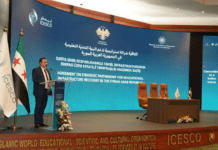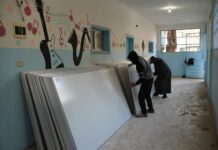
The Syrian Transitional Government (STG) has embarked on an ambitious plan to overhaul and rejuvenate the nation’s education sector, aiming to ensure access to quality education for children and adults of all genders, economic classes, and backgrounds. The effort is spearheaded by Education Minister Nazir Mohammad al-Qadri, who emphasized the sector’s critical role in shaping Syria’s future. “Education is a red line for the Syrian people, more important than food and water,” Qadri said in an interview from his office in Damascus.
Removing the Legacy of Baathism
As part of the reforms, Syria will eliminate references to the Baath Party, the authoritarian political entity that ruled the country from 1963 until its fall on December 8, from its educational curricula. However, Qadri stressed that this move would not result in other restrictions or significant changes to school programs, such as limiting girls’ access to learning.
“The right to education is not limited to one specific gender,” Qadri said, noting that “there may be more girls in our schools than boys.” The Baath Party historically used education as a tool to instill loyalty among Syria’s youth to the ruling regime. By removing its influence, the STG aims to create an inclusive and apolitical system.
Maintaining Inclusivity & Religious Education
Syria’s reputation for strong educational standards has endured despite 13 years of civil war. The new administration plans to preserve key elements of the system, including religious studies for both Muslims and Christians.
“Religion will continue to be taught as a subject in school,” Qadri said, adding that primary schools will remain co-educational, while secondary schools will adhere to the current separated model in line with long-standing practices existing throughout the country.
Rebuilding Amidst Challenges
The task of rebuilding Syria’s education infrastructure is monumental. Years of conflict have left approximately half of the country’s 18,000 schools damaged or destroyed. Entire cities lie in ruins, and Western sanctions continue to strain resources.
Despite these challenges, the STG has extended an olive branch to former state employees, many of whom have returned to work under the new administration. “The Syrian people contributed to saving the region from chaos and foreign interventions,” Qadri said, urging international support to help the nation recover.
A Focus on Representation
The STG has committed to ensuring equal treatment for all of Syria’s diverse communities, including Kurds, Christians, Druze, and Alawites. This inclusivity is central to the new government’s vision of rebuilding a nation that accommodates all its citizens.
The newly appointed ministers reflect this ethos, with many being young professionals in their 30s and 40s. At 54, Qadri is one of the oldest members of the government. Born in Damascus, he was imprisoned by the Assad regime in 2008 on charges of “inciting sectarian strife.” After his release a decade later, he fled to northern Idlib, eventually becoming education minister in the Syrian Salvation Government (SSG) in 2022. Now serving as education minister in the STG, Qadri continues to pursue his education, finishing a master’s thesis in Arabic language.
Looking Ahead
The STG’s Ministry of Education aims to refurbish and rebuild schools, improve educational quality, and ensure no child is left behind. The initiative seeks to make education accessible and equitable, providing opportunities for every Syrian regardless of gender, economic status, or background.
As the political and social framework of the new Syrian state continues to take shape, Qadri’s ministry is poised to play a pivotal role in shaping a brighter future for the nation. “Education is not just about learning; it’s about rebuilding Syria from its foundations,” Qadri said. “We are committed to giving every Syrian child the chance to succeed.”








